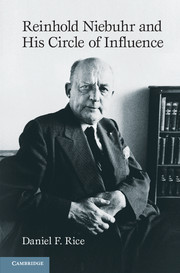Book contents
- Frontmatter
- Contents
- Acknowledgments
- Introduction
- Chapter 1 Paul Tillich (1886–1965)
- Chapter 2 John Dewey (1859–1952)
- Chapter 3 Norman Thomas (1884–1968)
- Chapter 4 Arthur Schlesinger Jr. (1917–2007)
- Chapter 5 Hans Morgenthau (1904–1980)
- Chapter 6 George Kennan (1904–2005)
- Chapter 7 Felix Frankfurter (1882–1965)
- Afterword
- Index
- References
Chapter 1 - Paul Tillich (1886–1965)
Published online by Cambridge University Press: 05 November 2012
- Frontmatter
- Contents
- Acknowledgments
- Introduction
- Chapter 1 Paul Tillich (1886–1965)
- Chapter 2 John Dewey (1859–1952)
- Chapter 3 Norman Thomas (1884–1968)
- Chapter 4 Arthur Schlesinger Jr. (1917–2007)
- Chapter 5 Hans Morgenthau (1904–1980)
- Chapter 6 George Kennan (1904–2005)
- Chapter 7 Felix Frankfurter (1882–1965)
- Afterword
- Index
- References
Summary
Niebuhr, Tillich, and “The German Situation”
Paul Tillich and Reinhold Niebuhr became the two most influential and widely read theologians in American Protestantism during the middle third of the twentieth century. The historian Van Harvey claimed that “it can safely be said that Reinhold Niebuhr and Paul Tillich were the last two public theologians in this country, that is, theologians whose names were recognized because they contributed to those types of discourse that seriously engage American intellectuals.” The relationship between Niebuhr and Tillich began not in the realm of theology, as one might suppose, but rather in the cauldron of pre–World War II German politics. Tillich, at age forty-seven, arrived in New York from Germany with his family on November 4, 1933, by way of an arrangement made between Union Theological Seminary and Columbia University. In the midst of this arrangement, Union president Henry Sloane Coffin had Reinhold Niebuhr obtain “more personal information concerning [Tillich] – the nature of Hitler’s hostility to him, the size of his family, his academic record, and the probable date of his arrival should we cable him to come.” Each faculty member contributed five percent of his wages in support of Tillich’s first year salary, and the Board of Directors voted him the use of a small apartment. Niebuhr sent a cable to Tillich informing him of the decision and urged Columbia University professor of philosophy Horace S. Friess to meet with Tillich while Friess was in Germany that summer. Tillich was told that he need not teach a course during the fall, while being given time to study English, but he would teach one course during the spring semester. Upon his arrival in New York in November, 1933, Tillich was met by Friess and, soon after, was welcomed to his new apartment at Union Theological Seminary by Niebuhr’s wife Ursula.
- Type
- Chapter
- Information
- Reinhold Niebuhr and His Circle of Influence , pp. 13 - 45Publisher: Cambridge University PressPrint publication year: 2012

